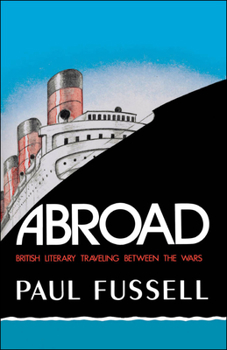Abroad: British Literary Traveling Between the Wars
Select Format
Select Condition 
Book Overview
A book about the meaning of travel, about how important the topic has been for writers for two and a half centuries, and about how excellent the literature of travel happened to be in England and America in the 1920s and 30s.
Format:Paperback
Language:English
ISBN:0195030680
ISBN13:9780195030686
Release Date:June 1982
Publisher:Oxford University Press, USA
Length:256 Pages
Weight:0.75 lbs.
Dimensions:0.8" x 5.5" x 8.5"
Customer Reviews
2 ratings
A Metanalysis of British Travel Writing
Published by Thriftbooks.com User , 16 years ago
Paul Fussell is universally famous for his extensive studies on the cultural impact of the Twentieth Century Wars. In this 1980 book instead he dedicates his attention to a topic that appears as a serene hiatus between massacres: British travel literature of the 20's-30's. Fussell has no shame in affirming that the books published in this period are the best travelogues ever written, since from the 1930's on "travel" degenerated into "tourism". The reason of the escape from England of the young literate, witty people of the WWI generation, is identified on one hand in the loathing, disgust and angst due to the terrible experiences of those that had fought in the trenches and on the other of those that bore the meagre economical war situation and restriction of liberty at home. This imperative pulsion to fuge Fussell identifies in the phrase "I Hate it Here", which recurs often as the leitmotif of his work. What writers wanted to flee was England, home, the bad weather, the poverty, so the South and in particular the sunny Mediterranean was elected as a putative home for the body and soul. However travel in the Nineteenth Century was becoming more difficult due the introduction of some limitations, like the passport in the 20s, that posed a practical and psychological problem, forcing people to realize their age, aspect and economical status together with the passing of time due to the photographs always at hand. The "passport nuissance" was accompanied by the formal identifications of many before unrecognized and unmapped frontiers, that caused other problems and reasons for reflexion. In a long chapter, which reads almost as a bitter moral essay, the Author decribes the evolution from the Nineteenth Century exploration, to travel and to modern tourism, and the influence of this passage on travel books. In this section Fussel's nostalgia of the past is palpable and somehow displeasing, because as all travel narrative addicts know, good books have been written also after the '30's. Following the analysis of the psychological conditions of the travel writers are the practical considerations of the cheapness and sexual freedom of living abroad, that must not be forgotten. Homosexuality, pederasty, irregular unions were a major drive to living abroad. The following chapters are devoted to the indepth rereading of the Authors Fussell thinks the most influent of the period: the never forgotten and much cried over Robert Byron (this chapter owes much to Christopher Sykes' essay on Byron in "Four Studies in Loyalty"), the cultivated, perverse and irrequietous Norman Douglas, the sun-lover and place seeking and preposition plethoric D.H. Lawrence, the moral anomaly-searcher Evelyn Waugh. Ample excerpta are quoted and commentated to explain each Author's peculiarity and importance. The conclusive remarks are on the structure and the literary value of travel books, diction which is preferred over "travelogues" or "travel logs". Actually Fussell points out
Before travel became tourism...
Published by Thriftbooks.com User , 26 years ago
Time was when travel was as memorable an adventure as a stunning love affair, a divorce, a personal catastrophe. That time was between the wars -- the Great War and WW2 -- and no group of observers was better positioned to write of it than the great British travel commentators. You will think differently about the activity and meaning of travel after you read this captivating, if occasionally slow-going book by one of the finest observers of the 20th century at work today. And not least of all ABROAD takes you back into the world of T. E. Lawrence's time, when ships were the only way to cross the seas.




